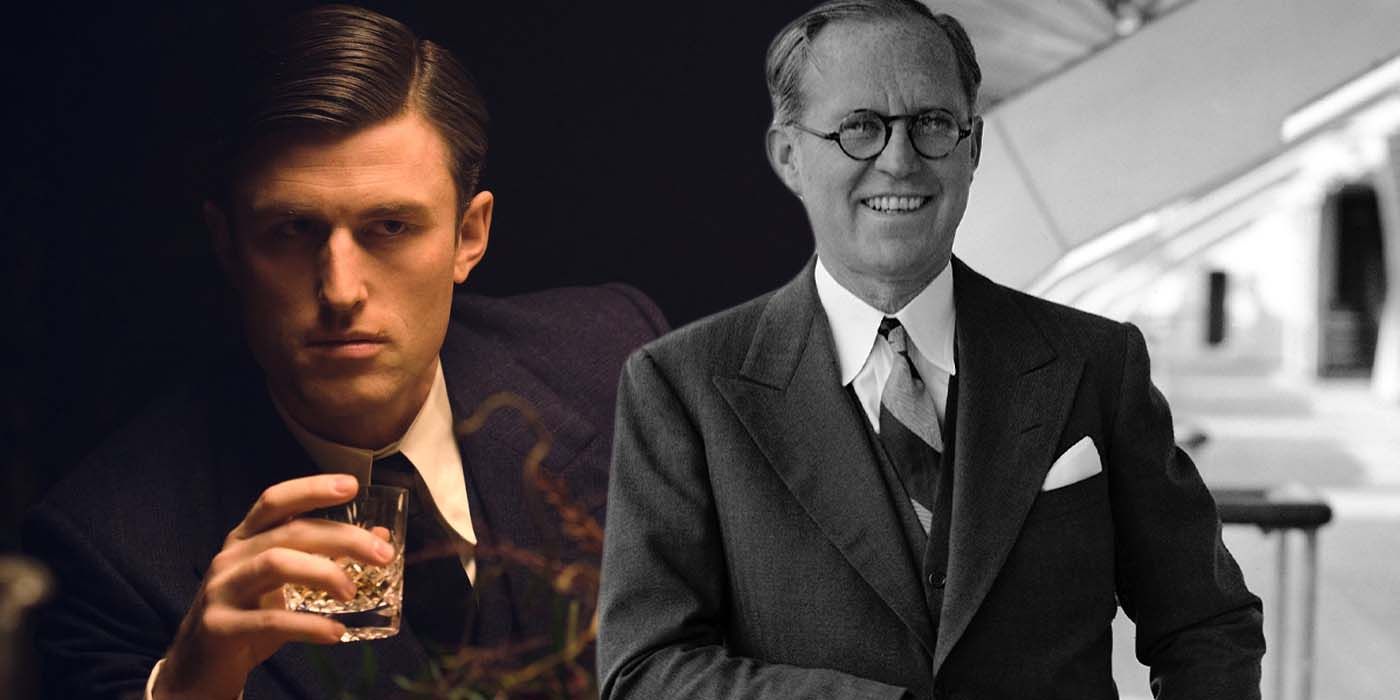Warning: This contains spoilers for Peaky Blinders season 6.
In Peaky Blinders season 6, Jack Nelson appears as the new crime boss antagonist and Nazi sympathizer, whose true intentions with the Shelby family remain unknown — here’s who he is and who he’s based on. Jack Nelson joins Thomas Shelby’s ever-growing list of adversaries while his cast of allies continues to dwindle. After the dramatic end of Peaky Blinders season 6, it is clear that Thomas Shelby will face off against Jack Nelson and Oswald Mosley in the Peaky Blinders movie.
When Tommy Shelby (Cillian Murphy) meets with Michael Gray (Finn Cole) in Peaky Blinders, it is to negotiate a business deal with Michael’s new associates. One of Michael’s men says they will have to take the proposal to “Uncle Jack in Boston.” Tommy identifies this man as Jack Nelson, Gina Gray’s (Anya Taylor-Joy) uncle and a figure with a sketchy past. Throughout the season, it remains unclear with whom exactly Jack Nelson aligns himself. He has close dealings with fascists, President Roosevelt, and the mafia and wants the Shelby family’s help with a new opium deal, while simultaneously wanting Arthur killed, but his story feels unfinished. The Peaky Blinders finale leaves Jack Nelson’s story completely up in the air, intentionally setting up the movie.
Throughout its run, Peaky Blinders has had a somewhat tenuous connection with history. While characters and events are often based on true stories, Peaky Blinders tends to take things in their own direction. For example, season 5’s Oswald Mosely was a real political figure who was altered in some ways to fit the TV show’s narrative. The most notable occurrence of this is with the Peaky Blinders themselves. While the Peaky Blinders might not exist as a group in season 6, the real street gang had lost most of their power by 1910, before Peaky Blinders season 1, and by the 1920s, Billy Kimber’s gang had far surpassed them. Jack Nelson is inspired by a real person, but the true story behind the character is heavily fictionalized.
Who Plays Peaky Blinders’ Jack Nelson?
Jack Nelson first appears in Peaky Blinders season 6, episode 2, “Black Shirt.” He meets with Tommy at a church to discuss Tommy’s plans with an opium business. In season 6, Jack Nelson is portrayed by the actor James Frecheville. James Frecheville was born in 1991, meaning that he is 15 years younger than Cillian Murphy. This helps to set up Jack Nelson as part of the new world in which Tommy Shelby no longer can find a place, also coupled with the fact that Jack is a huge Nazi sympathizer and part of the fascist organization that Tommy wants to bring down in England. James Frecheville is best known for his roles as Jamie Sullivan in The Dry and Feeney in Black ’47.
Who Is Peaky Blinders Newcomer Jack Nelson Based On?
When working out who Peaky Blinders’ season 6 antagonist, Jack Nelson, was based on, it can be tempting to look towards openly criminal organizations. Some aspects of Peaky Blinders season 6 suggest that he might be based on Frank Wallace, who ran the Irish-American Gustin Gang in Boston in the 1920s and 1930s. Frank Wallace was a formidable figure but was killed by the Italian-American mafia in 1931. His brother, Stephen Wallace, took over after his death, and could also have influenced the character of Jack Nelson, especially as the Italian-American gangs are mentioned as a threat to Nelson in Peaky Blinders season 6. However, while Frank and Stephen Wallace might have influenced some elements of Jack Nelson’s story, Peaky Blinders creator Steven Knight has confirmed that rather than being based on a gangster, it is a politician: Peaky Blinders Jack Nelson is based on Joseph Kennedy Sr., the father of JFK.
While historians have refuted the claims, criminals such as Frank Costello insisted that they worked with Joseph Kennedy on bootlegging operations and that this is where he made his initial fortune. By basing Jack Nelson on Joseph Kennedy, Peaky Blinders appears to either be using this version of Kennedy Sr.’s history or melding him with the Wallace brothers for the sake of the narrative. After becoming a bank president at a very early age, Kennedy began to generate huge profits in real estate. During World War One he worked on the production of transports and warships, which led to him being introduced to the future president, Franklin D. Roosevelt. Later in life, Kennedy became particularly close with Roosevelt, was appointed as Chairman of the U.S. Maritime Commission, and was the ambassador to the United Kingdom from 1938 until 1940.
While Joseph Kennedy was never convicted of any crimes, there are implications that he was involved in illegal and immoral dealings. This would all match up to the clean image that Gina implies Jack Nelson is attempting to cultivate. During the 1920s, Kennedy made a considerable amount of money on Wall Street using tactics that would later be made illegal, including insider trading, but mostly avoided the repercussions of the 1929 Wall Street crash. At the same time, he began investing in movies, production studios, and theaters. One man, Alexander Pantages, refused to sell his 63 theaters to Kennedy and was later charged and tried for rape. While he claimed that Kennedy had set him up, Pantages’ public image was damaged, and he had to accept a smaller offer from Kennedy for his theaters. The woman who had initially accused Pantages of rape claimed on her deathbed that Kennedy had indeed been behind the scheme to frame Pantages. Using all of this history about Joseph Kennedy helped Peaky Blinders to create a criminal in the form of Jack Nelson, who commits white-collar crimes and pursues unethical business deals as a contrast to previous antagonists, who have been more inclined to get their hands dirty.
Jack Nelson Ties Season 6 Closer To Tommy’s Fight Against Fascism
The fact that Peaky Blinders season 6’s Jack Nelson is based on Joseph Kennedy Sr. helped elevate the scope of the series, moving the threats to a more global space. Nelson was set up to meet Oswald Mosley at the behest of Tommy. He linked the two up to better understand just how deep England’s fascist ties went – and discover he did. As the series came to a close, Nelson’s antisemitic sentiments became clearer, especially at the penultimate dinner party staged at Tommy’s house. Essentially, Tommy is trying to see how he can overthrow the fascist party in England while undermining Oswald’s efforts since his failed assassination attempt. It’s also clear that the Nazi sympathizer Jack Nelson has his own plan for the Shelbys. He admits to wanting to kill Arthur Shelby and confronts Billy with torture to become an informant before his death at the hands of Duke.
Peaky Blinders season 5 also saw the surprising return of Tom Hardy’s Alfie Solomons, and he made his reappearance in season 6. To further his fight against the fascists, Tommy tells Alfie that the latter’s uncle was killed by an antisemitic group, fueling the fire for Solomon to help him. The Joseph Kennedy Sr. inspired Jack Nelson is a particularly fitting foil for Solomons, as Kennedy was rampantly antisemitic. Despite a figure like Kennedy being linked to the past, it’s chilling how his statements align with the ever-rising popularity of the alt-right today. Kennedy spoke out against Jewish people in public and private communications, and regularly used slurs to refer to them. Kennedy went as far as to respond to reports of Nazi assaults on Jews by suggesting that “they brought it on themselves,” and told the German ambassador to the United Kingdom that he sympathized with their plans to get rid of the Jews but disliked the publicity it created. Since the villain Jack Nelson embodies all of these views and actions, he makes for an antagonist who can bring together all of the ideological battles Thomas Shelby and his allies have fought throughout Peaky Blinders. It feels likely that his storyline will be officially resolved in the upcoming Peaky Blinders movie.
Peaky Blinders season 6 releases on Netflix on June 10th.
About The Author



























































